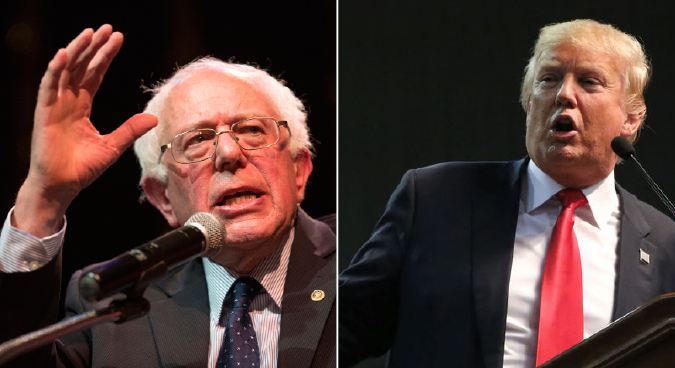Outsiders Trump, Sanders win New Hampshire primary
February 9, 2016
Republican Donald Trump and Democratic candidate Bernie Sanders won the nation’s first presidential primary overwhelmingly Tuesday as rebellious voters sent a strong message demanding dramatic change in Washington.
Sanders, a senator from Vermont, led former Secretary of State Hillary Clinton 58 to 40 percent with 23 percent of precincts reporting and was declared the winner by TV networks soon after the polls closed. Clinton had narrowly won last week’s Iowa caucus and a victory here, or even a close second, would have given her important momentum. Instead, she suffered a crushing defeat, creating new pressure to win the upcoming Nevada caucus and South Carolina primary.
Claiming victory and thanking cheering supporters, Sanders said his victory sent a powerful signal to the political establishment.
Advertisement
“We won because of your energy,” he said. “Together, we have sent a message that will echo from Wall Street to Washington, from Maine to California … that the government of our great country belongs to all of the people and not just a handful of wealthy campaign contributors and their super PACs.”
Clinton conceded defeat and congratulated Sanders shortly after 9 p.m. EST.
“I still love New Hampshire, and I always will,” she said, with her husband and daughter standing nearby. “Now we take this campaign to the entire country. We’re going to fight for every vote in every state.”
She emphasized areas where she agreed with Sanders, and sought to share some of his appeal to those angry at the influence of big money in politics. “I will fight to reign in Wall Street,” she said. “And you know what? I know how to do it.”
Trump, a New York City real estate magnate, was coasting to his first election win. With 22 percent of precincts reporting, he had 34 percent in the multi-candidate field and also was declared the runaway winner moments after the polls closed.
New Hampshire Republicans did not appear ready to settle the race to become the chief establishment alternative to the outspoken outsider. Gov. John Kasich of Ohio was leading for second place with 16 percent. Trailing were Sen. Ted Cruz, R-Texas, at 11.6 percent; Jeb Bush, the former governor of Florida, 11.5 percent; Sen. Marco Rubio, R-Fla., 10 percent; and Gov. Chris Christie of New Jersey, 8 percent.
Kasich, who conducted more than 100 town hall meetings in the state, did well among late deciders, a huge bloc of voters. Rubio did not, and might end up the night’s biggest loser. Eight days earlier, he claimed victory with a close third-place finish in Iowa, and was counting on at least a solid runner-up showing here. But his robotic debate performance Saturday triggered doubts about his ability to think on his feet and clearly hurt him.
Advertisement*
Christie’s campaign might end if he finished in single digits. He had bet heavily on doing well in a state with a center-right electorate similar to his own.
Voters, though, wanted something other than veteran politicians. For Trump, coasting to his first election victory, and Sanders, a self-described democratic socialist and Congress’ longest serving independent, the victories were resounding triumphs over business-as-usual politics. They beat some of the biggest, best-funded names in 2016 and they did it in unconventional ways.
Although Trump’s pitch was conservative and Sanders’ was liberal, both vowed to end the influence of big money in politics. They financed their campaigns without cash from corporate donors or wealthy friends. Both mobilized “undeclared” voters not aligned with either political party.
Republican voters were unified in their anger, according to network exit polls. Ninety-one percent said they were dissatisfied with the federal government. About 40 percent were angry about how it was operating.
Helping to fuel Trump’s rise was widespread Republican dissatisfaction with the party, as half of the voters said GOP politicians had betrayed them. Voters throughout the week since the Iowa caucuses have said they were disappointed with the Republican-led Congress, complaining that it had failed to undo Obama administration initiatives such as the Affordable Care Act.
As a result, roughly half the voters Tuesday wanted someone from outside the usual political circles. Trump has never been active in GOP politics, and he promised to bring his business acumen and hardball style to gridlocked Washington.
Trump also benefited by voters’ accepting a shift away from campaigning as usual. The way to win New Hampshire is supposed to be person-to-person campaigning through the bitter cold and snow, but Trump usually limited his efforts to a mass rally or two a day.
His ground game lagged. About 1 in 5 Republican voters was contacted by a Trump supporter, far below contacts by most other candidates, according to a Monmouth University survey.
But Trump’s brashness seemed only to help him. Two-thirds of Republicans said they backed temporarily banning Muslims from entering the United States, as Trump has suggested.
Democrats didn’t want that sort of radical change, but they were eager for a candidate who is honest and trustworthy. Sanders scored far better among those voters than Clinton, who’s been dogged by an FBI investigation of her use of a private email server while secretary of State. In the campaign’s closing days, she also was criticized for accepting big money for speeches to corporate interests, and she wouldn’t release transcripts of the closed-door remarks.
Sanders was well-known here, since he’s represented neighboring Vermont since 1991. He caucused with the Democrats in Congress but insisted on keeping the independent label. His liberal views, notably support for universal health care and an estimated $13.2 trillion in higher taxes over the next decade, put him outside the party mainstream.
But in a year when voters sought to shake up the political system, Sanders’ refusal to take corporate money reverberated, and younger voters found his ideas appealing.
(c)2016 McClatchy Washington Bureau
Visit the McClatchy Washington Bureau at www.mcclatchydc.com
Distributed by Tribune Content Agency, LLC.
Advertisement










